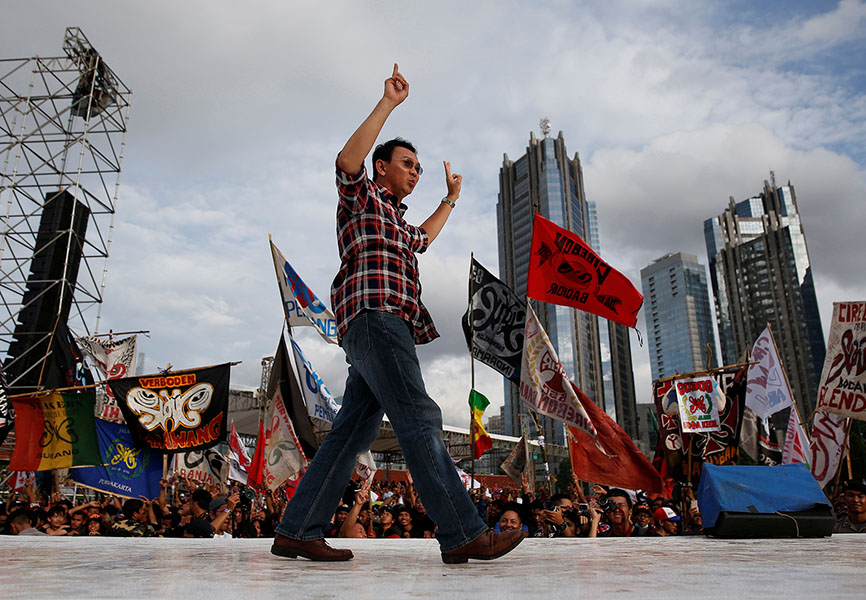This week, voters in Indonesia's capital cast their ballots in an election where the identities of the incumbent Chinese Christian governor are the centerpiece of the campaign in the world's most populous Muslim country.
Exit polls show Basuki Tjahaja Purnama (Ahok), in first place, but he failed to meet the 50% threshold necessary to prevent a runoff. Ahok will face former education minister Anies Baswedan in a second round of voting on April 19.
Eurasia Group's Asia analyst, Achmad Sukarsono, answers a few key questions.
In many countries, a gubernatorial race wouldn't make international headlines. Why is this election for Jakarta governor so important?
First, it affects the reform agenda of President Joko Widodo (Jokowi) on a national level. The election is a test for the president because many of the programs of incumbent Jakarta Governor Ahok were initiated by Jokowi before his 2014 presidential run. Ahok was Jokowi's running mate in the 2012 Jakarta gubernatorial election and inherited the post of governor when his predecessor became president.
As the Jokowi-Ahok partnership continued as a national-local teamwork, key programs like the Jakarta Mass Rapid Transit system, the airport rail network and revitalization of waterways gained pace and uplifted the president's infrastructure drive. Following in Jokowi's footsteps, Ahok has also advanced bureaucratic and fiscal reforms, making this election a yardstick to measure how voters respond to the duo's achievement-based politics, which is new in Indonesia.
The Jakarta race affects the reform agenda of President Joko Widodo (Jokowi) on a national level.
It also illustrates the role of Islam in politics. The election is a way to gauge the level of Islamic populism in the world's most populous Muslim country. Conservative Muslims are insecure with the growing inclusion of non-Muslims in politics, marked by Ahok's run to be the first non-Muslim elected to govern the capital.
Non-Muslims have won local polls before, but they did so in areas where Muslims are not overwhelmingly dominant. Jakarta is 85 percent Muslim, similar to Indonesia as a whole. An Ahok victory will prove Muslims in the cities are rational voters, threatening Islamists who use religion to gain opportunities.
That is why Islamists are focusing on Ahok's off-the-cuff statements, including on Islam, to paint an image of cultural conflict. His critique of the use of a Koranic verse has led to massive rallies in the capital and a blasphemy trial that looms above the election. Even Jokowi needs to walk a fine line when dealing with this Muslim anger as he needs votes from the masses for his re-election in 2019. He had to allow the trial while he court Muslim leaders behind the scenes. Anti-reform politicians, especially Muslim ones, have also joined the anti-Ahok bandwagon. More dangerously, the Islamic State has piggybacked on this Muslim movement to spread their influence.
This race is a microcosm for the complicated role of Islam in Indonesian politics.
Why is it so consuming attention in Indonesia?
A media circus is inevitable. The election combines religion, ethnicity, tweeting politicians, the Islamic State, fake news, legal cases and also sex (the leading anti-Ahok Islamist allegedly sexted his student) in the Twitter capital of the world (more tweets come from Jakarta than any other city). A hundred other sub-national regions also had elections on February 15 but none came close to the drama of the Jakarta election.
This election has also distracted the Jokowi national government. While the president's political consolidation in 2016 has given him better policymaking capacity, politicians and officials are so consumed by the Ahok saga that reform plans and bill debates have taken the back seat. For politicians, especially those who like to use nationalism and other types of populism to guise their vested interests, this election is also important to see the power of public opinion.
What comes next?
Ahok faces former education minister Baswedan in an April runoff. It will be a tight battle between two contrasting figures – a brash but productive incumbent versus a mild-mannered academic who uses his Muslim religion as leverage.
However, some Muslim voters, unimpressed with Baswedan's academic retorts and vague programs, could pick Ahok. Baswedan will fight hard as he has an axe to grind against Jokowi, who sacked him from the cabinet last July on personal issues although he performed well. Jokowi cannot afford to shield his ally if an Ahok quip triggers another massive wave of Muslim populism or convinces judges that he is blasphemous.
To put it plainly, Ahok will lose if he says anything that offends Muslims again.

 Jakarta governor Basuki Tjahaja Purnama, known as Ahok, waves to the crowd as he attends a music concert ahead of this month's elections in Jakarta, Indonesia February 4, 2017. REUTERS/Darren Whiteside
Jakarta governor Basuki Tjahaja Purnama, known as Ahok, waves to the crowd as he attends a music concert ahead of this month's elections in Jakarta, Indonesia February 4, 2017. REUTERS/Darren Whiteside